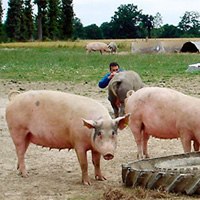Balanced organic diet for healthy and productive animals
Researchers from 10 European countries developed a range of recommendations through the CORE Organic II project ICOPP on how to provide a balanced organic diet for healthy and productive animals. Supplying sufficient protein may especially pose a problem, and their recommendations include ideas on how to solve this.

The content of this article has been taken from the EIP-AGRI website.
Organic pig and poultry farms in the EU must feed their animals with 100 % organic feed. However, there has been an exemption to allow smaller amounts of non-organic feed in the diet to ensure a proper nutrition; this exemption runs out by end 2016.
Researchers from 10 European countries have developed a range of recommendations through the ICOPP project on how to provide a balanced organic diet for healthy and productive animals. Supplying sufficient protein may especially pose a problem, and their recommendations below include ideas on how to solve this.
Alternative sources of protein which (at least partially) can substitute commonly used sources of protein for pigs:
- Dehulled sainfoin seeds and heat-treated grass pea seeds:
these can also be used to feed weaned piglets, without negatively affecting their health and growth; - Mussel meal could be used to replace fishmeal in feed for fattening pigs if the price is competitive, and if the hygienic quality is sufficient;
- Roughage (e.g. grass silage) can contribute to protein supply if harvested at an early stage, chopped and mixed with concentrate;
- Well-established alfalfa (also called lucerne) is a very suitable foraging crop for fattening pigs.
The pigs clearly prefer to graze instead of rooting if the alfalfa is well-established and of high nutritional value.
Both sainfoin and grass peas can produce seeds in difficult growing conditions, which may in some cases compensate for their relatively low yields.
For poultry the following feed recommendations may help supply sufficient protein:
- Protein from organically produced Spirulina algae can fully replace protein from traditional organic sources in broiler diets
- Low-protein diets stimulate the broilers to forage on the range area and direct foraging can contribute much to protein supply in broilers of slow-growing breeds. - without detrimental effects on growth performance
- Refining plant-based ingredients to enrich the relative content of the amino-acid Methionine seems to be a useful way to supply relevant protein sources for poultry, e.g. for sunflower seed cake
- Reducing the energy content of the diet, while maintaining the energy:
- Methionine ratio is another option to fulfil the requirement of 100 % organic diets. This can for instance be relevant when including high quality roughage or herbs in the feed mixture for laying hens
The project ICOPP
The project, ICOPP – ‘Improved contribution of local feed to support 100 % organic feed supply to pigs and poultry’ - was funded through the CORE-Organic II ERANET.
13 partners from the following countries were involved: Denmark, Netherlands, United Kingdom, Sweden, Austria, Germany, Finland, Switzerland, France and Lithuania.
Together, these countries produce 85 and 80 percent respectively of all the European organic pigs and poultry.
More information
Read the article on: eip-agri's website
Go to ICOPP's list of results and publications
All publications from ICOPP are available on Organic Eprints
For more information on CORE Organic II projects, see the project website: http://coreorganic2.org/
Or read more about ICOPP on the website of Organic Research Centre
For more information, please contact: John.Hermansen@agrsci.dk